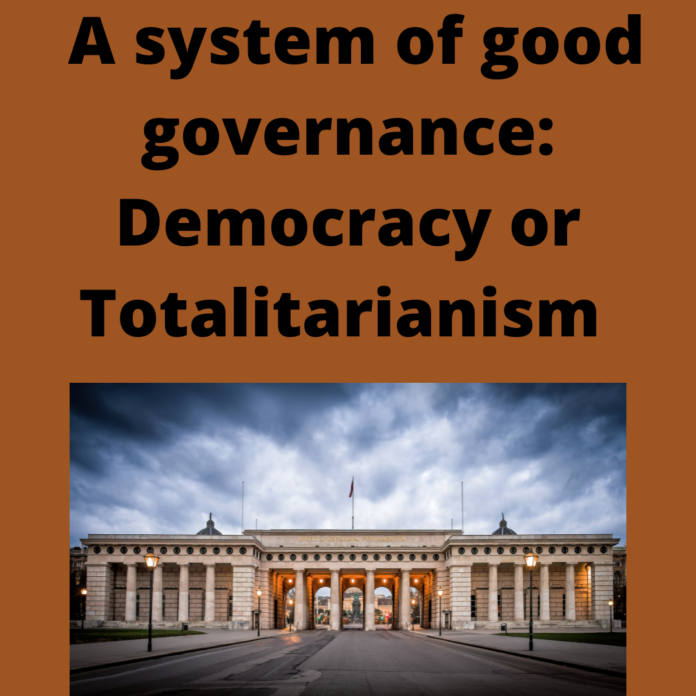Choyoo (a North Korean) and Chandan (an Indian) met over a social media platform through the darknet. After talking for quite a good amount of time with Choyoo, Chandan found him to be genuine, interesting and had built a good rapport with him. So he asked him about his family and other things, Choyoo shared with him a recent execution of one of his family members by Kim’s dictatorial govt. just because they had a different point of view from the govt. over some key policies and was outspoken through their writings. Here Chandan, who is living and learning in a democratic country, was a student of political science and has had a keen interest in understanding the different systems and forms of government. So Chandan showed his interest in knowing more about the ground situations of governing system in North Korea and to discuss similarities and differences between two systems of governance based on the ‘Democracy’ and the ‘Totalitarianism’, and Choyoo agreed. Before they jumped into the discussion, Choyoo requested Chandan to simplify some technical terms of political science along with their wider connotations, as Choyoo didn’t study political science of international connotations because of his limited reach to such resources.
Chandan explained, ‘Government’ is a system that generally has three organs: legislatures (it makes laws and policies), judiciary (it upholds the validity of constitutional provisions and provides justice), and executives (it implements law and policies). And democracy is a system of government where the laws are made by the people or their representatives, that is, the ultimate authority is vested in the hands of the people. Some examples of democracies around the world are India, the US, Australia, South Africa, Switzerland, among others. Whereas ‘totalitarianism’ is another system of government where a ruler is ultimate authority and people will be governed by the rules made by him. Some examples of totalitarianism are the Soviet Union (1922-43; Joseph Stalin), Nazi Germany (1933-45; Adolf Hitler), The People Republic of China (1949-76; Mao Zedong), North Korea (1948-present; Kim Dynasty), among some others.
Let’s now discuss how democracy is different from totalitarianism on the ideological front. In a democracy, the main principles which guide the government is encoded within the constitution of the country and are incorporated with a wider consensus by the people. But in the case of totalitarianism, all principles are made by the dictator based on his/her ideology and discretion which serve only their interests regardless of how they will impact the general people of the country. In the case of Nazi government in Germany A. Hitler used racist (anti-semitism) as a form of pseudo-nationalism to mobilize the support of the people of Germany. This helped him to establish a strong Nazi base over the time to make Germany great once again. Choyoo shared his views regarding North Korea’s totalitarianism and said, here Kim’s dynasty project themselves as ‘Great leaders’ but work like ‘Absolutist, supreme leader’ and make people believe that they are the only capable ones who can transform North Korea into a prosperous nation, by any means necessary deemed fit by the dictators.
Chandan elaborated further and said, the impact of Democracy and Totalitarianism in the political life of people is quite discerning. Where former allows people to enjoy fundamental rights such as freedom of speech and expression, freedom of religion, freedom of equality, and many more but most of these rights are just daydreams for the people living in the latter form of regime. This implies democracy encourages people’s active participation in politics as it defines the government of the people, by the people, and for the people. Whereas, contrary to this, in a totalitarian state which is generally defined by “ALL WITHIN THE STATE, NONE OUTSIDE THE STATE, AND NONE AGAINST THE STATE”, and doesn’t tolerate rights such as the right to dissent and many a time takes away the right to live, which is a basic human right, without any rule of law. Choyoo opined that the impact of a dictatorial govt. can also be seen in the progress of a society. In the case of North Korea, although North Korea became self-sufficient with the motto of “MAN IS THE MASTER OF HIS DESTINY” but our economy has a very fragile foundation because it is leader-led and leader-centered not people-led or people-centered. Chandan said by nodding, yes, as the peaceful world is a community of nations that follow certain principles to maintain global-order such as adhering to human rights of the people; giving liberty of thoughts, expression, belief, faith, worship and; providing social, economic and political justice to all; among other fundamental rights. But because of the absolutist nature of totalitarian government, they face many international sanctions, for example, FATF (Financial Action Task Force) under its blacklist has put sanctions on Iran and North Korea, which notifies them as High-Risk Jurisdictions for investment. So hindering the economic development of the country and socio-economic development in long term.
Choyoo asked Chandan, what are the socio-cultural differences between a democratic and a totalitarian country? Chandan replied, as Wiktionary defines the term ‘totalitarianism’ as a system of government in which the people have virtually no authority and the state wields absolute control, for example, a dictatorship; and ‘democracy’ as a system of government under the direct or representative rule of the people of its jurisdiction. Clearly, in former people are confined in govt. made bubbles and have almost no opportunities to explore the diversity of thoughts, practices, and ways of working and living. And because of this, people are unable to get the mature understanding to appreciate their own truth. Whereas people in a democracy get enough opportunities to develop their thoughts and learn from cross-cultures and societies to build a deeper understanding of their own. This ultimately helps them to get the feeling of the world as a family, ‘Vasudheva Kutumbkam’, despite having diversity of religions, languages, nationalities, and ethnicity, and of other kinds.
Now Choyoo asked Chandan, Is Democracy a foolproof system of government? Chandan replied, NO. Because when there is a point of accomplishing a specific goal is concerned, it causes too many procedural delays and sometimes, esp. in emergencies, renders the system inefficient. At this point, the totalitarian govt. works effectively and accomplishes targeted goals in time with acceptable quality as happened in the case of China’s outreach in foreign countries through its infrastructure development in comparison to India’s image in this respect. Choyoo, yes, North Korea accomplishes almost all govt. set objectives in times. Chandan, nevertheless, in extraordinary situations, democratic countries such as India also have some provisions such as the Disaster Management Act of 2005 to mobilize all its resources for a specific set of objectives, apart from some other emergency provisions for such situations.
To conclude the discussion Chandan said, every form of government has its pros and cons but the point here is that are the benefits of one outweigh the risk it poses. Which is true in case of democracy, where citizen’s privacy, right to freedom and equality have more impact in citizens’ life. To make a Democracy more successful some lessons from totalitarian govt. to make the democratic system more efficient and effective can be incorporated without compromising citizens’ rights. Thomas Jefferson, the 3rd US President, had aptly said, “Government exists for the interest of governed, not for the governors.”, so the democracy should be modified as per the demos’ needs, not as per the seat-holders’ greeds.










